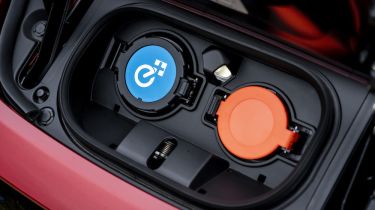Nissan Leaf review: range, battery & charging
The Leaf does a good job of getting close to its claimed range figures, although more modern rivals go further and charge faster
|
Model |
Range |
Wallbox charge time |
Rapid charge time |
|
Leaf |
168 miles |
7hrs 30mins (6.6kW) |
60mins (20-80%, 50kW) |
|
Leaf e+ |
239 miles |
11hrs (6.6kW) |
90mins (20-80%, 50kW) |
The Nissan Leaf has many tools in its armoury to maximise the number of miles it can travel on a charge. Even if you only stick it in Eco mode and forget about the range-maximising e-Pedal, the e+ version will do well over 200 miles. Some reports suggest the range-topper will charge at up to 100kW, though Nissan still quotes figures for a 50kW maximum – taking anything between 60 and 90 minutes for a 20-80% charge; rivals are faster in this regard.
The Nissan does get an app for activating charging remotely, checking on the charging status, setting the climate control, and more. However, it’s rated extremely poorly on the various app stores, and our experience of it when living with the car is that it’s quite hard to use, needs updating or reinstalling too often, and sometimes fails to connect with the car at all.
Nissan Leaf range
The entry-level 39kWh Nissan Leaf’s claimed range is 168 miles from a charge, and in our own tests, we’ve consistently achieved more than 160, which is impressively close to the official number. Naturally, your Leaf’s range will vary based not only on how you drive it, but also on the accessories you use, such as air-conditioning.
As with other electric cars, cold weather can affect your range, so you can expect the total driving range to dip – in this case to maybe as low as 130 miles – in cold weather or if you drive mostly on the motorway (where electric cars are less efficient than they are around town and on slower roads).
The bigger-battery Leaf e+ version boosts the car's official range to 239 miles. During our extended period of time driving the car, we found it averaged around 3.5 miles per kWh and just over 210 miles in warmer weather and mixed driving conditions.
Charge time
Electric car charging technology is evolving rapidly and while the Leaf’s compatibility with CHAdeMO charging connectors was fine when the second-generation model made its debut in 2018, things have since moved on and now the much faster CCS port has become the industry standard.
As a result of this, the Leaf’s maximum rapid charging speed maxes out at just 50kW – half that of what’s possible in a Vauxhall Corsa Electric. Nissan says a 20-80% charge will take 60 or 90 minutes for the 40kWh and 62kWh models respectively. Whichever way you look at it, almost all rivals – even those with bigger batteries – can charge faster; both the cheaper MG4 and pricier Volkswagen ID.3 max out at around 135kW and can perform similar charges in less than 40 minutes.
Most of the time, however, you’ll likely be plugging into a 7.4kW home wallbox; this will charge the standard Leaf to 100% in seven hours, while the e+ model will take slightly longer at 10.5 hours. Of course, you can always use a standard three-pin plug, although this will at least take a tedious 18 hours to complete a full charge.




